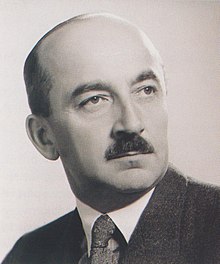Ferenc Nagy | |
|---|---|
 Nagy in 1946 | |
| Prime Minister of Hungary | |
| In office 4 February 1946 – 31 May 1947 | |
| President | Zoltán Tildy |
| Deputy | Mátyás RákosiÁrpád Szakasits |
| Preceded by | Zoltán TildyMátyás Rákosi (acting) |
| Succeeded by | Mátyás Rákosi (acting)Lajos Dinnyés |
| Speaker of the National Assembly of Hungary | |
| In office 29 November 1945 – 5 February 1946 | |
| Preceded by | Béla Zsedényi |
| Succeeded by | Béla Varga |
| Member of the High National Council | |
| In office 7 December 1945 – 1 February 1946 | |
| Preceded by | Béla MiklósBéla ZsedényiMátyás Rákosi |
| Succeeded by | Zoltán Tildy(as President of Hungary) |
| Member of the National Assembly | |
| In office 15 June 1939 – 12 April 1944 | |
| In office 2 April 1945 – 3 June 1947 | |
| Personal details | |
| Born | 8 October 1903 Bisse, Austria-Hungary |
| Died | 12 June 1979 (aged 75) Herndon, Virginia, U.S. |
| Citizenship | HungaryUnited States (from 1947) |
| Nationality | Hungarian |
| Political party | Independent Smallholders, Agrarian Workers and Civic Party |
| Children | 5 |
Ferenc Nagy (Hungarian: [ˈfɛrɛnt͡s ˈnɒɟ]; 8 October 1903 – 12 June 1979) was a Hungarian politician of the Smallholders Party who served as Prime Minister of Hungary from 1946 until his forced resignation in 1947. He was also a Speaker of the National Assembly of Hungary and a member of the High National Council from 1945 to 1946. Nagy was the second democratically elected prime minister of Hungary, and would be the last until 1990 not to be a Communist or fellow traveler. The subsequent Hungarian prime minister Imre Nagy was unrelated to him.
A longtime peasant advocate who took part in the anti-fascist resistance, Nagy attempted to consolidate democratic rule during his brief tenure as Prime Minister at the head of a grand coalition of Smallholders, Communists, and Social Democrats. However, he was ultimately unable to resist the intrigues of the Soviet-backed Hungarian Communist Party, which subverted his rule and destroyed his party's elected majority through a fabricated conspiracy. A coup d'état by Mátyás Rákosi, deputy premier and leader of the Communist Party, forced Nagy to resign and go into exile in the United States in June 1947. Subsequently, Nagy became a leader of the Hungarian émigré community and academic lecturer who often spoke on Eastern European affairs. He tried and failed to return to his home country during the Hungarian Revolution of 1956, and lived out the rest of his life in the United States.